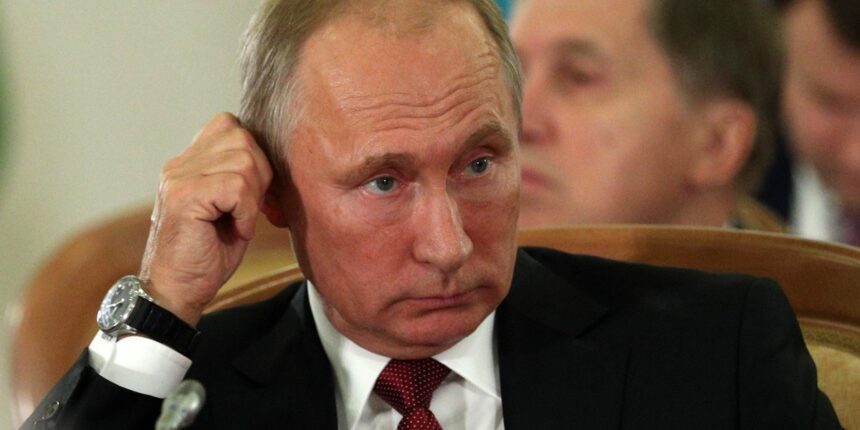
As Vladimir Putin was welcoming African heads of state to a summit in St. Petersburg, renegade warlord Yevgeny Prigozhin stole the limelight in the president’s home city, schmoozing with visiting officials and lauding a military coup in Niger.
The Wagner mercenary group leader was supposed to go into exile in neighboring Belarus under a deal to end last month’s armed mutiny that shook Putin’s rule and killed about a dozen air force crew as his troops advanced to within 200 kilometers (124 miles) of Moscow.
Instead, he’s been traveling freely in and out of Russia and was invited to talks with Putin in the Kremlin together with his top Wagner commanders only days after the revolt.
Late Friday evening, he praised Putin for organizing the summit, hailing his Africa outreach with no mention of the recent tensions at home. “I believe that the forum went well and we should see the results from it in the near future,” he told Afrique Media television, according to a transcript posted in his Telegram channel.
Russia offers countries of the region economic ties and “security export,” he said, just hours after Wagner announced it was sending a new deployment of mercenaries to the Central African Republic. He cited that country, Mali and Niger as among those “which are becoming more and more independent.”
Prigozhin’s presence in St. Petersburg, which is also his native city, as Putin hosted the Russia-Africa summit seemed calculated to upstage the showcase event.
Having run an internet “troll factory” for years that posted material online to damage opponents of the Kremlin, the appearance of a photograph on social media of Prigozhin meeting with a Central African Republic official sucked attention away from hours of earnest discussion between Putin and African leaders.
It also added to controversy over the insurrection that Putin has described as bringing Russia to the brink of “civil war.” Despite the seriousness of the threat, Prigozhin has emerged unscathed from the confrontation and is busy developing his business empire in Africa.
A second photograph on Telegram showed Prigozhin meeting the head of a pan-African TV channel on the sidelines of the summit.
While Russia joined other powers in calling for the release of ousted Niger President Mohamed Bazoum, the mercenary leader welcomed this week’s military coup as “a declaration of independence” in an audio statement on a Telegram channel linked to Wagner. “It’s getting rid of the colonizers,” Prigozhin said.
Putin chose not to punish Prigozhin after the mutiny because it was directed not against him but at Defense Minister Sergei Shoigu, people familiar with the matter said. The president still needs the Wagner founder’s skills in Africa, the people said.
Wagner is being allowed to keep some of its extensive operations on the continent, including in the Central African Republic, despite Prigozhin’s rebellion, according to people familiar with the matter.
“The person who suffered the most as a result of the mutiny was Putin himself,” Tatiana Stanovaya, a senior fellow at the Carnegie Russia Eurasia Center, said in an online commentary. “He created a monster that escaped from his control and spooked the elites. Everyone saw that the Kremlin was paralyzed with indecision, and that Prigozhin escaped any real punishment. Many are currently wondering whether Putin is the leader Russia needs in difficult times,” she said.
Russia is vying for influence in Africa with the US, the European Union and China. Wagner’s army of thousands of guns-for-hire has for years given the Kremlin a low-cost instrument to wield influence, making inroads at the expense of the US and former colonial power France.
“Putin is really smart that he resolved the dispute with Wagner,” Sergei Markov, a political consultant with close Kremlin ties, said on his Telegram account. “We have to keep the most effective army in the world, so it becomes stronger and fights more for Russia. But within Russia there will be discipline of course.”
Wagner already has security ties with two former French colonies — the Central African Republic and Mali — following disputes that led to the expulsion of French and international forces fighting jihadists in the Sahel region. It has held talks with military rulers in Burkina Faso who also expelled French troops, and sent a small contingent to the Democratic Republic of Congo to offer training and assistance to forces battling rebels, according to people familiar with the matter.
Western officials say the developments in Niger are very bad news for France, as Bazoum was seen as a key ally in a grouping of five Sahel states. One said the coup was unsurprising given Niger’s overall fragility and warned that things are not moving in the right direction for France in Gabon and Senegal, too.
French President Emmanuel Macron on Friday strongly condemned the military takeover in Niger and said it poses a threat to the entire region. France and the US maintain bases in Niger, which is a key center for international efforts to fight jihadists in Sahel.
“Russia is immediately jumping on opportunities,” said Lou Osborn, an analyst at All Eyes on Wagner, a consortium that tracks the group’s activities using open-source investigation. “Big win if Niger becomes a new client.”
–With assistance from Samy Adghirni.








